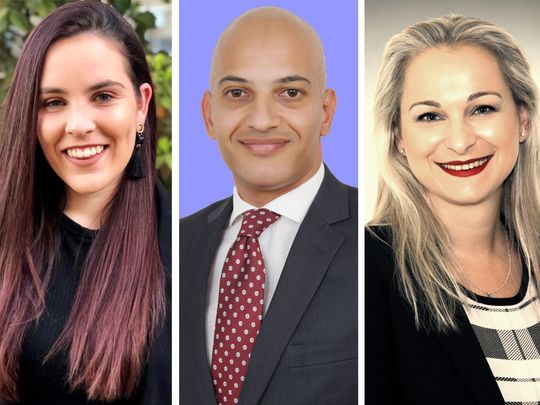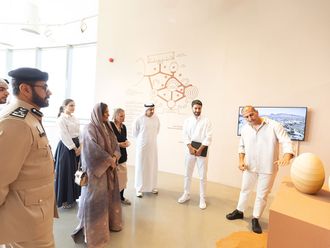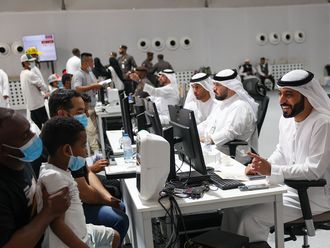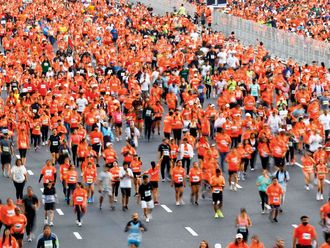
Dubai: Vadia Rai is a 47-year-old mother of two. “I have a unique heritage of Syrian and Czech ancestry. Having spent the past two decades in Dubai, my upbringing in Syria, coupled with experiences living in Europe and the UAE, have granted me a diverse perspective on life and adeptness in navigating various cultures,” she says.
But if there’s one thing that has particularly struck her amid the diversity, it is the perceptions around mental health.
“It remains a sensitive topic in this part of the world. Discussions about it are often taboo, and individuals fear being labelled as “crazy” for broaching the subject,” she says.
But far from making an idle observation, she wanted to do something about it.
As a result, she became a mental health first aider.
Positive difference
“I felt compelled to become one—to make a positive difference in others’ well-being and dismantle the stigma surrounding mental health,” she says as the Mental Health Awareness Month gets underway. “My aim is to foster open dialogue and accessibility to support, ultimately empowering others to seek the assistance they need.”
Rai says she was lucky she was able to find her calling at her workplace, FTI Consulting, where some other colleagues have also upskilled themselves as mental health first aiders to be of potential help to their communities.
But who is a mental health first aider?
Rai’s colleague Tanisha Vorster, a 26-year-old South African, explains. “A mental health first aider is someone who can help recognise those who may be experiencing poor mental health and provide them with first-level support and early intervention. We help people with an immediate issue and can direct them the right support resources to meet their needs.”
Vorster, who has been living in the UAE for over two years, said, “My own struggles of navigating mental health in a working environment motivated me to become a mental health first aider. Luckily, my employers have partnered with Mental Health First Aid (MHFA) England to provide necessary training. I wanted to help break the stigma surrounding mental health and inspire others to take better care of their mental well-being.”
Fellow mental health first aider Ahmed Ismail also had his own reasons to become one.
“During my 16 years in the UAE, the busy and competitive work environment has led to several instances of stress-related illnesses amongst me and my friends . Part of my coping mechanism was to educate myself about the importance of maintaining a balanced life and overcome these stressors.”
Typical cases handled
According to Rai, mental health first aiders encounter a range of cases, including individuals experiencing anxiety, depression, suicidal thoughts, psychosis or abuse issues. “My experience was intervening with someone experiencing a panic attack and using calming techniques to help them regain control. I believe this assistance has the potential to make a difference in someone’s life by providing support and connecting them with the resources they need,” she noted.
Ismail shared how mental health first aiders are trained to practise a five-step plan.
“This is the MHFA Action Plan and it’s called ALGEE: Assess and assist, listen non-judgmentally, give reassurance and information, encourage appropriate professional help and encourage self-help.”
The protocol for administering mental health first aid, can vary, adds Vorster.
But like all first aiders, even mental health first aiders can do only that much. “It’s important to remember that while mental health first aiders can offer valuable support, they are not a substitute for professional mental health treatment. Their role is to provide immediate assistance and connect individuals with appropriate resources, but ongoing care from mental health professionals may be necessary for long-term support and recovery,” clarifies Rai.
Who is a mental health first aider?
A mental health first aider is someone trained to provide initial support to individuals experiencing mental health challenges or crises. They are equipped with the knowledge and skills to offer assistance until appropriate professional help can be accessed or until the crisis resolves.
To become a mental health first aider, individuals typically undergo specialised training provided by organisations like Mental Health First Aid (MHFA) England.
Protocol for administering mental health first aid: The ALGEE Action Plan
• Assess for risk of suicide or harm: Ask direct questions about suicidal thoughts or intentions.
• Listen nonjudgmentally: Provide a safe and supportive space for the individual to express their feelings.
• Give reassurance and information: Offer hope and practical information about mental health conditions and available resources.
• Encourage appropriate professional help: Assist the individual in accessing professional support from mental health services or other resources.
• Encourage self-help and other support strategies: Discuss coping skills, self-care techniques, and ways to build a support network.












